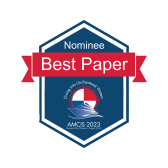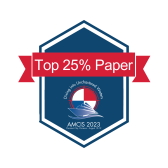Loading...
Paper Type
Complete
Description
This study investigates the impact of health policy, specifically the Individual Mandate Repeal (IMR), on the use of medical crowdfunding. We employ a difference-in-differences research design and find that IMR has led to an increase in medical crowdfunding usage, with significant heterogeneity among users. Specifically, individuals with high cultural capital and bridging social capital, but low bonding social capital, are more likely to increase their use of medical crowdfunding. These results suggest that the socio-technology for healthcare financing purpose (i.e., online medical crowdfunding) responds to the gap of the Affordable Care Act (i.e., IMR), and its usage is shaped by individual differences in cultural and social capital. The policy implication is that medical crowdfunding platform provides opportunities to take on the shortcomings of health policy, but the opportunity exploration or its usages are disparate across populations with varying levels of capital. Public health policymakers may develop policies fostering bridging social capital to expand the healthcare affordable opportunities for underserved populations without imposing taxes and mandate regulations.
Paper Number
1566
Recommended Citation
Liu, Yuanyuan; Fan, Rui; and Ravichandran, T., "Policy Change, Social and Cultural Capital and Medical Crowdfunding Use: A Quasi-Natural Experiment" (2023). AMCIS 2023 Proceedings. 13.
https://aisel.aisnet.org/amcis2023/sig_health/sig_health/13
Policy Change, Social and Cultural Capital and Medical Crowdfunding Use: A Quasi-Natural Experiment
This study investigates the impact of health policy, specifically the Individual Mandate Repeal (IMR), on the use of medical crowdfunding. We employ a difference-in-differences research design and find that IMR has led to an increase in medical crowdfunding usage, with significant heterogeneity among users. Specifically, individuals with high cultural capital and bridging social capital, but low bonding social capital, are more likely to increase their use of medical crowdfunding. These results suggest that the socio-technology for healthcare financing purpose (i.e., online medical crowdfunding) responds to the gap of the Affordable Care Act (i.e., IMR), and its usage is shaped by individual differences in cultural and social capital. The policy implication is that medical crowdfunding platform provides opportunities to take on the shortcomings of health policy, but the opportunity exploration or its usages are disparate across populations with varying levels of capital. Public health policymakers may develop policies fostering bridging social capital to expand the healthcare affordable opportunities for underserved populations without imposing taxes and mandate regulations.
When commenting on articles, please be friendly, welcoming, respectful and abide by the AIS eLibrary Discussion Thread Code of Conduct posted here.





Comments
SIG Health